- Clone
- MIH42 (See other available formats)
- Regulatory Status
- RUO
- Other Names
- B7RP2
- Isotype
- Mouse IgG1, κ
- Ave. Rating
- Submit a Review
- Product Citations
- publications
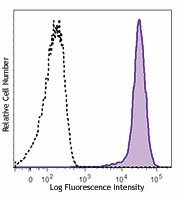
-

Human B7-H3 transfected P815 cells were stained with CD276 (clone MIH42) APC (filled histogram) or mouse IgG1, κ APC isotype control (open histogram).
| Cat # | Size | Price | Quantity Check Availability | Save | ||
|---|---|---|---|---|---|---|
| 351005 | 25 tests | 125 CHF | ||||
| 351006 | 100 tests | 314 CHF | ||||
B7-H3, assigned as CD276, is a type I transmembrane protein and shares 20-27% amino acid identity with other B7 family members. Human B7-H3 has a single extracellular variable-type immunoglobulin (IgV)-IgC domain, a signature intracellular domain, and an additional isoform, known as 4Ig-B7-H3, containing nearly exact tandem duplication of the IgV-IgC domain and most likely caused by exon duplication. B7-H3 mRNA is broadly expressed in normal tissues whereas its protein expression is relatively rare. The expression of B7-H3 is induced on T cells, natural killer (NK) cells, and antigen-presenting cells (APCs), including dendritic cells (DCs) and macrophages. It can be upregulated during the maturation from monocytes to DCs, or during the interaction between DCs and regulatory T cells. B7-H3 has been shown to be a co-stimulatory molecule that inhibits T-cell responses. B7-H3 has also been identified to bind TLT-2 involved in the intracellular signaling pathway.
Product DetailsProduct Details
- Verified Reactivity
- Human
- Reported Reactivity
- African Green, Cynomolgus, Rhesus
- Antibody Type
- Monoclonal
- Host Species
- Mouse
- Immunogen
- Human B7-H3
- Formulation
- Phosphate-buffered solution, pH 7.2, containing 0.09% sodium azide and BSA (origin USA)
- Preparation
- The antibody was purified by affinity chromatography and conjugated with APC under optimal conditions.
- Concentration
- Lot-specific (to obtain lot-specific concentration and expiration, please enter the lot number in our Certificate of Analysis online tool.)
- Storage & Handling
- The antibody solution should be stored undiluted between 2°C and 8°C, and protected from prolonged exposure to light. Do not freeze.
- Application
-
FC - Quality tested
- Recommended Usage
-
Each lot of this antibody is quality control tested by immunofluorescent staining with flow cytometric analysis. For flow cytometric staining, the suggested use of this reagent is 5 µl per million cells in 100 µl staining volume or 5 µl per 100 µl of whole blood.
- Excitation Laser
-
Red Laser (633 nm)
- Product Citations
-
- RRID
-
AB_2564404 (BioLegend Cat. No. 351005)
AB_2564404 (BioLegend Cat. No. 351006)
Antigen Details
- Structure
- Type I transmembrane protein with extracellular variable-type immunoglobulin domain and intracellular domain
- Distribution
-
Dendritic cells, macrophages, natural killer cells, induced T cells
- Function
- Involved in intracellular signaling pathway
- Interaction
- Co-stimulator molecule inhibits T-cell response. Binds Trem like transcript 2 protein (TLT-2) to involve in intracellular signaling.
- Ligand/Receptor
- Trem like transcript 2 protein (TLT-2)
- Cell Type
- Dendritic cells, Macrophages, NK cells, T cells, Tregs
- Biology Area
- Cell Biology, Costimulatory Molecules, Immunology, Signal Transduction
- Molecular Family
- CD Molecules
- Gene ID
- 80381 View all products for this Gene ID
- Specificity (DOES NOT SHOW ON TDS):
- CD276
- Specificity Alt (DOES NOT SHOW ON TDS):
- CD276
- App Abbreviation (DOES NOT SHOW ON TDS):
- FC
- UniProt
- View information about CD276 on UniProt.org
Related Pages & Pathways
Pages
Related FAQs
Other Formats
View All CD276 Reagents Request Custom Conjugation| Description | Clone | Applications |
|---|---|---|
| Purified anti-human CD276 (B7-H3) | MIH42 | FC |
| PE anti-human CD276 (B7-H3) | MIH42 | FC |
| APC anti-human CD276 (B7-H3) | MIH42 | FC |
| PE/Cyanine7 anti-human CD276 (B7-H3) | MIH42 | FC |
| PerCP/Cyanine5.5 anti-human CD276 (B7-H3) | MIH42 | FC |
| PE/Dazzle™ 594 anti-human CD276 (B7-H3) | MIH42 | FC |
Customers Also Purchased
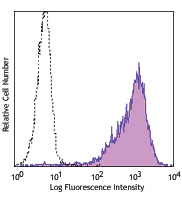

Compare Data Across All Formats
This data display is provided for general comparisons between formats.
Your actual data may vary due to variations in samples, target cells, instruments and their settings, staining conditions, and other factors.
If you need assistance with selecting the best format contact our expert technical support team.
-
Purified anti-human CD276 (B7-H3)
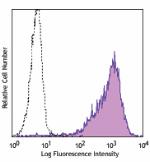
Human B7-H3 transfected P815 cells were stained with CD276 (... -
PE anti-human CD276 (B7-H3)

Human B7-H3 transfected P815 cells were stained with CD276 (... -
APC anti-human CD276 (B7-H3)
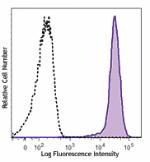
Human B7-H3 transfected P815 cells were stained with CD276 (... -
PE/Cyanine7 anti-human CD276 (B7-H3)
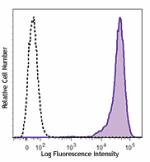
Human B7-H3 transfected P815 cells were stained with CD276 (... -
PerCP/Cyanine5.5 anti-human CD276 (B7-H3)
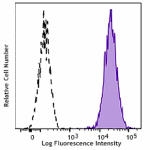
Human B7-H3 transfected P815 cells were stained with CD276 (... -
PE/Dazzle™ 594 anti-human CD276 (B7-H3)
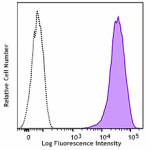
Human B7-H3 transfected P815 cells were stained with CD276 (...
 Login / Register
Login / Register 










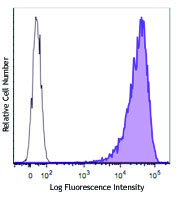
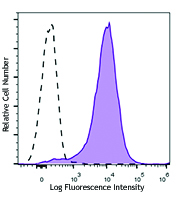



Follow Us